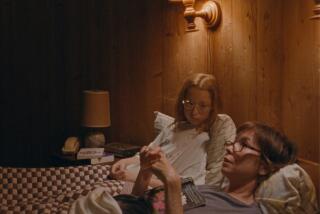How to Break Your Own Heart : FICTION : A DESERT OF PURE FEELING,<i> By Judith Freeman (Pantheon Books: $24; 273 pp)</i>
Judith Freemanâs novel, âA Desert of Pure Feeling,â is aptly named. It is a book about people who lack the courage of their convictions--and evictions--and subsequently break their own hearts. Freeman is a fine writer but on this book her ear wobbles in and out of focus as if she is sometimes listening to her own true voice and at other times listening to erroneous advice from others: âAdd a dialogue bridge here. They wonât get it otherwise.â
Such breaks in Freemanâs flow are profoundly artificial and, as all artifice does, they suffer by comparison to the genuine article, the very real music of her own unadulterated voice. At her best, Freeman is a True Note, a spare and elegiac melody master whose voice in prose, like Joni Mitchellâs in song, accurately captures the heart and heartache of the modern romantic dilemma: âI love and I am afraid to love.â
It is the fear to love that shapes Freemanâs plot: People connect and then, distrusting connection, they disconnect. Until bookâs end, they move through each otherâs lives as a series of missed chances. They find each other and let each other go through failures of nerve and trust at critical moments: âIf only Iâd said, if only Iâd done. . . .â They betray each other, but most of all they betray themselves. Perhaps it is true that this is most often what we moderns do, but, ah, it is hard to bear the sorrow of this behavior even at the remove of the printed page.
Freemanâs heroine, Lucy, a feckless young woman who marries young, bears a child with a damaged heart and subsequently falls into a long and passionate love affair with her childâs surgeon, is a woman who hedges her bets just when she should risk all. She remains in her loveless marriage. She allows, even causes, her lover Carlos to drift away. When she meets him again, the love of her life, two decades later, she is once more too self-involved to connect to him truly. When he needs her support she is too self-concerned to offer it. Blaming him for her own losses, she loses him as well.
And what of the lover? He is beset with the dilemma of all healers: when to give life through taking risk, when to sustain it by not risking further, when to say enough is enough? Unfortunately, the one life he cannot save is his own. Like his lover, and long after her departure, he remains in a conventional marriage, doing the right thing according to appearances and procedure but failing to take the risk that as a surgeon he might have: amputating to sustain life.
Beset by guilt due to a childhood wrong--a grievous wrong but one that he might have forgiven with the help of a loverâs compassionate heart--he hurls himself, finally not into health but into a fatal sea of self-loathing. As with Freemanâs heroine, it is not so much that he does not love his lover as that he cannot love himself.
Like Joan Didionâs, Freemanâs eye is mesmerizing and merciless. Like Didionâs, it has a gift for loving landscape, even the loveless landscape of Las Vegas. This was Didionâs turf for âPlay It As It Lays,â the novel âA Desert of Pure Feelingâ brings to mind in its astringent assessments of human nature. Hear this from Freeman:
âWater is everywhere here where you donât think it should be. It fills ponds and pools, forms moats around fake castles, erupts from sprinklers and fountains and runs off over-saturated lawns. I asked a taxi driver yesterday on the drive from the airport, âWhere does all this water come from?â I imagined he would say Lake Mead, the Colorado River, Hoover Dam. Instead, the cabbie pointed downward. âAquifers,â he said âIt all comes from underground,â and somehow as he said this, I could see all that water lying in dark pools deep beneath the earth. I envisioned it being sucked to the surface and erupting in a fine blue spray blowing out over the sand and sage and bunch-grass, landing like a mistaken blessing on the tawny and desiccated earth.â
It is less water than the milk of human kindness for which Freemanâs characters are thirsty. That her heroine is able, ultimately, to tap this inner vein is the bookâs redemption and her own. Devastated by losing Carlos through her own hand a second time, Lucy has retreated to the desert of the heart--and the heart of the desert. In Las Vegas, she encounters a stripper, a young woman dying of AIDS. In ministering to her wounded heart, Lucy, at bottom, heals her own.
More to Read
Sign up for our Book Club newsletter
Get the latest news, events and more from the Los Angeles Times Book Club, and help us get L.A. reading and talking.
You may occasionally receive promotional content from the Los Angeles Times.







